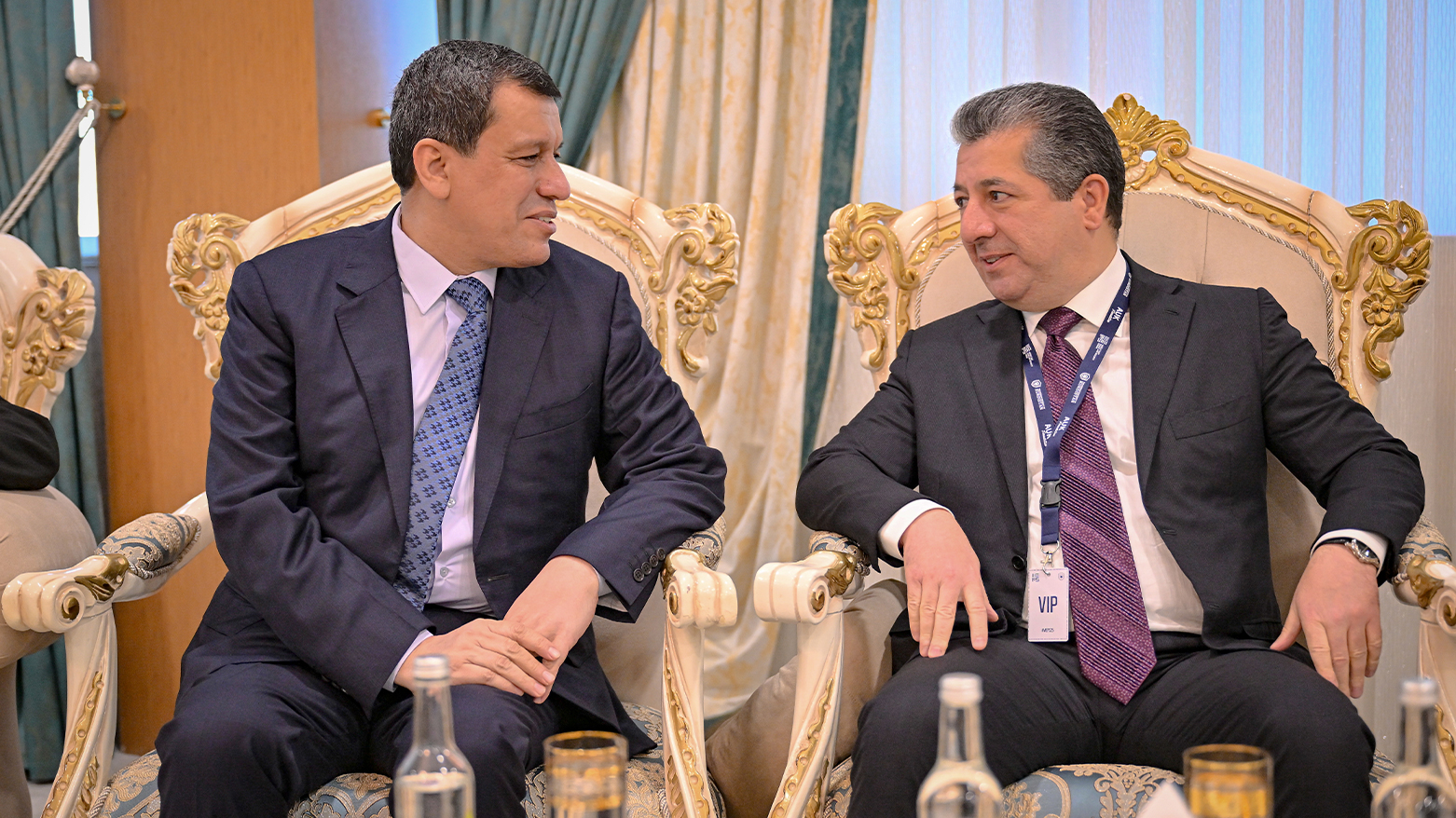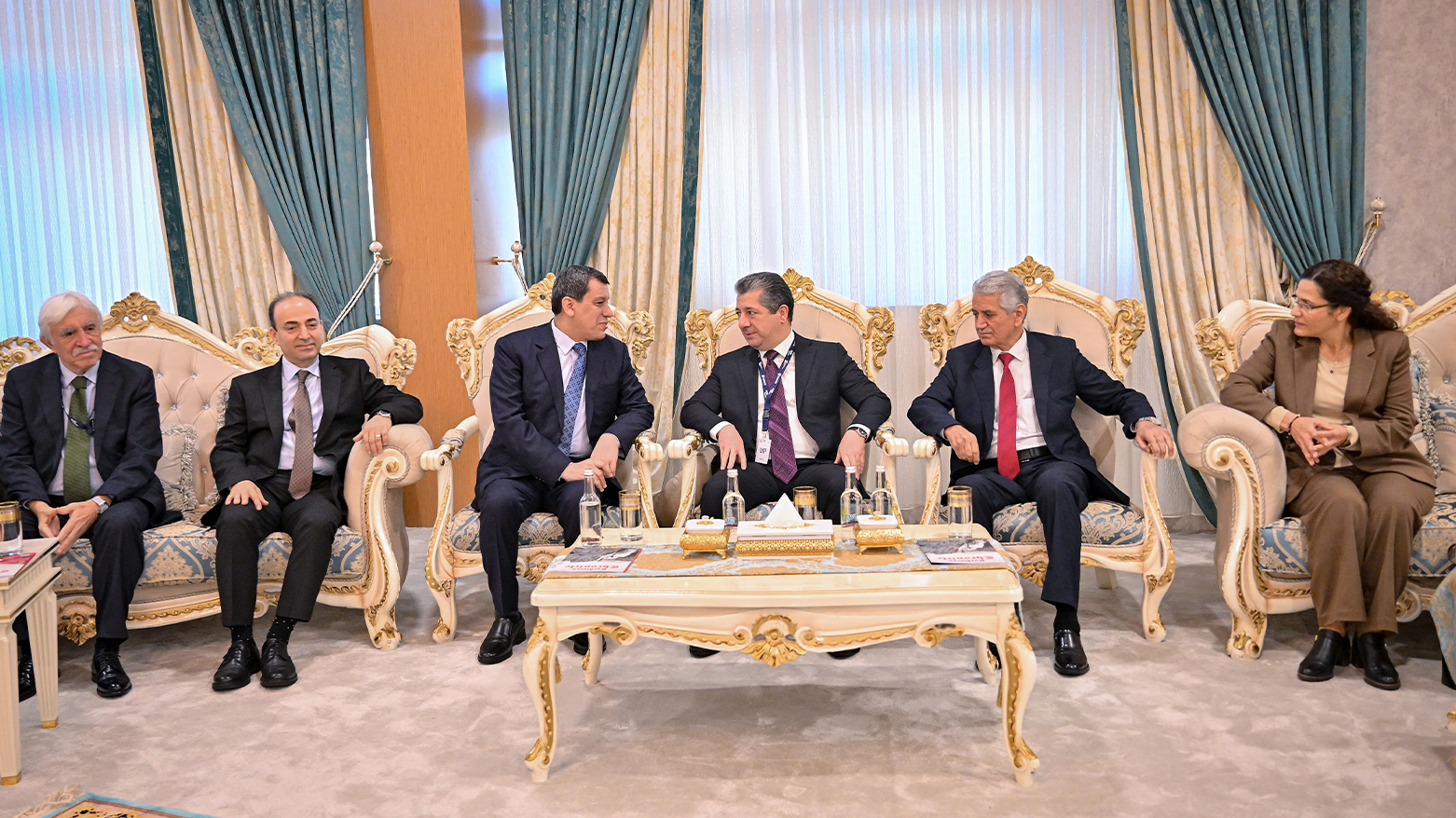PM Barzani Meets SDF Commander Mazloum Abdi at MEPS 2025, Discusses Syria’s Political Future
SDF Commander Mazloum Abdi hails PM Masrour Barzani and MEPS organizers for the warm welcome in Duhok, expressing hope that the forum’s commitments will advance solutions to regional crises and reinforce prospects for lasting peace.

ERBIL (Kurdistan24) — Kurdistan Region Prime Minister Masrour Barzani on Wednesday received Mazloum Abdi, the General Commander of the Syrian Democratic Forces (SDF), for talks on the evolving situation in West of Kurdistan "Rojava", Syria, and the wider region, on the sidelines of the sixth Middle East Peace and Security Forum (MEPS 2025) in Duhok.
The meeting included Ilham Ahmed, the Executive Committee’s head of foreign relations at the Democratic Autonomous Administration for North and East Syria DAANES, along with senior political figures such as Mohammed Ismail of the Kurdistan National Council (KNC), former Turkish MP Osman Baydemir, and current MP of the Peoples' Equality and Democracy (DEM) Party Cengiz Candar.
The discussions centered on regional dynamics, Syria’s political future, and the challenges facing Kurdish communities across the region.
Abdi and Ilham Ahmed were invited as key speakers at MEPS 2025, where they addressed developments in Syria, West of Kurdistan’s political trajectory, and broader regional shifts. Wednesday marked the second day of the forum’s proceedings.
In his presentation, Abdi thanked PM Barzani and the MEPS organizers for the invitation, expressing his appreciation for the warm reception in Duhok.
“We were welcomed with great warmth,” he said.
The SDF commander expressed hope that the conclusions and commitments emerging from MEPS 2025 would contribute to resolving key regional crises and strengthening prospects for peace in Syria and the broader Middle East.
The March 10 Agreement and Its Impact
In his remarks, Abdi highlighted the importance of the March 10 agreement signed this year between the SDF and the Syrian government, represented by President Ahmed Shar’a. He said the agreement prevented several destabilizing developments:
“It stopped a lot from happening. We were in the midst of a difficult war, but because of the March 10 agreement, the fighting stopped,” he noted.
The deal, he added, also prevented the fragmentation of Syria and stopped attempts by some actors to pit governorates against one another after regime collapse.
Abdi emphasized that for the first time in a century, the Kurdish question was explicitly acknowledged in a formal political framework: “In Syria’s last 100 years, Kurds’ rights were never recognized—our issue wasn’t even mentioned. But the March 10 agreement clearly addressed it. The rights of Kurds and all Syrian components must be guaranteed in the new constitution.”
The SDF commander stressed that Syria cannot return to the centralized Ba’ath-era system after 15 years of conflict. “Syria must become decentralized, with each region administering itself. This is the new reality, and no one can deny it,” he said.
“Everyone must accept this reality and move forward within this framework.”
“Every War Ends in Dialogue”
Abdi reiterated that sustainable solutions in Syria can only emerge through negotiations. “We have spent a long time in war. We know—and we have seen—that every war ends in dialogue. Even if you win on the battlefield, you eventually must negotiate,” he said.
He attributed the collapse of the previous Syrian regime to its rejection of dialogue and its insistence on centralized authority.
“The main reason for Bashar al-Assad’s former regime’s downfall was refusing dialogue and clinging to a rigid centralized system.”
Abdi added that the SDF did not seek conflict during the uprising but was compelled to defend its communities: “From the start of the Syrian revolution, we stood against the war. We did not fight until we had no choice. We only defended ourselves.”
Now, he said, the SDF is committed to dialogue and sees no need for further warfare: “Negotiation is the path we have chosen—and this is the view of all Syrians. Problems cannot be solved by war.”
MEPS 2025 continues in Duhok with sessions dedicated to the future of the Kurdistan Region, Iraq, Syria, and regional security.
MEPS has, in recent years, emerged as one of the Middle East’s most important platforms for addressing political, security, economic, and governance challenges. Organized annually at the American University of Kurdistan in Duhok province, in the Kurdistan Region, the forum attracts heads of state, prime ministers, ministers, diplomats, global experts, policymakers, academics, and business leaders from around the world.
The conference is known for its open, in-depth discussions on regional stability, counterterrorism coordination, economic diversification, climate challenges, energy transitions, and the future of partnerships across the Middle East.
It also serves as a critical venue for examining Iraq’s evolving political dynamics and the Kurdistan Region’s role as a reliable and stabilizing partner.
Beyond its diplomatic impact, MEPS has become a major vehicle for enhancing the Kurdistan Region’s global profile. By consistently convening high-level leaders and experts, the forum showcases Kurdistan as a secure, open, and dynamic environment capable of hosting world-class policy discussions, while simultaneously promoting investment opportunities and cultural visibility.
